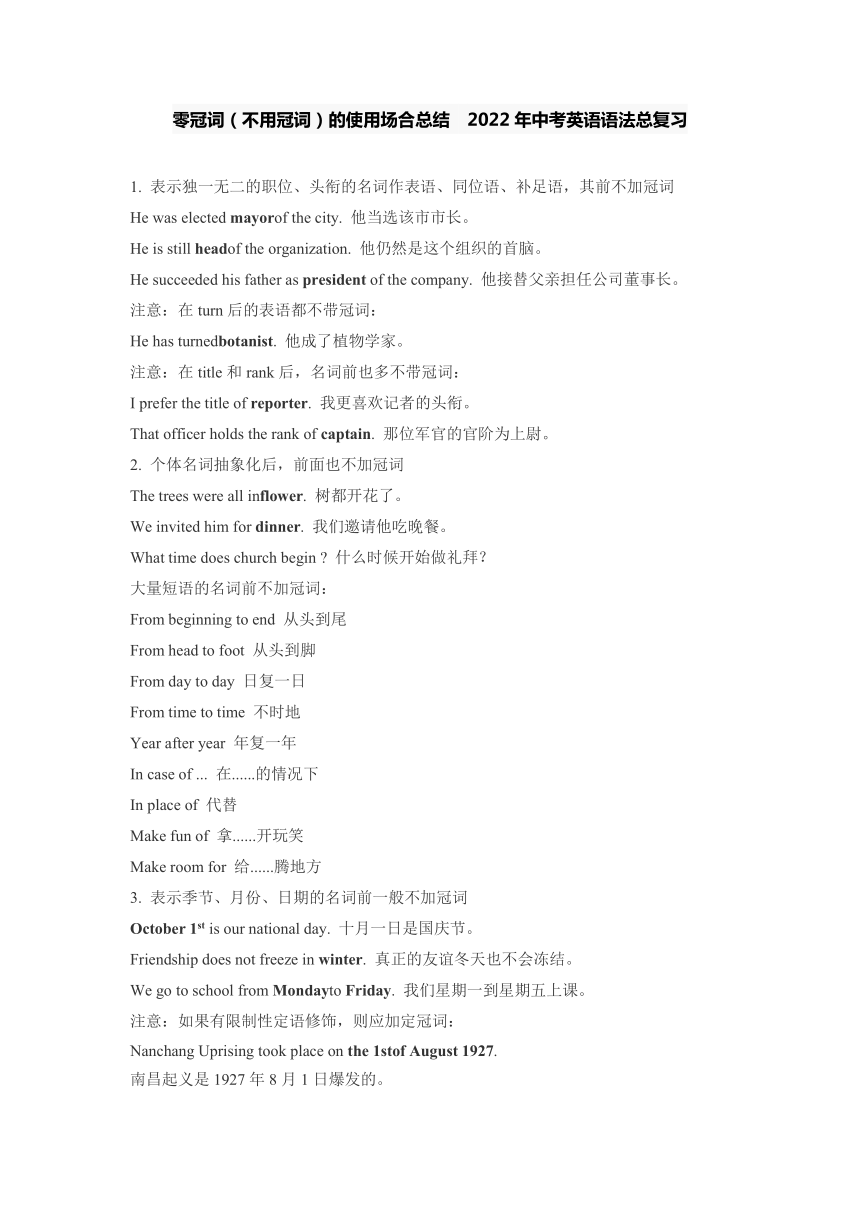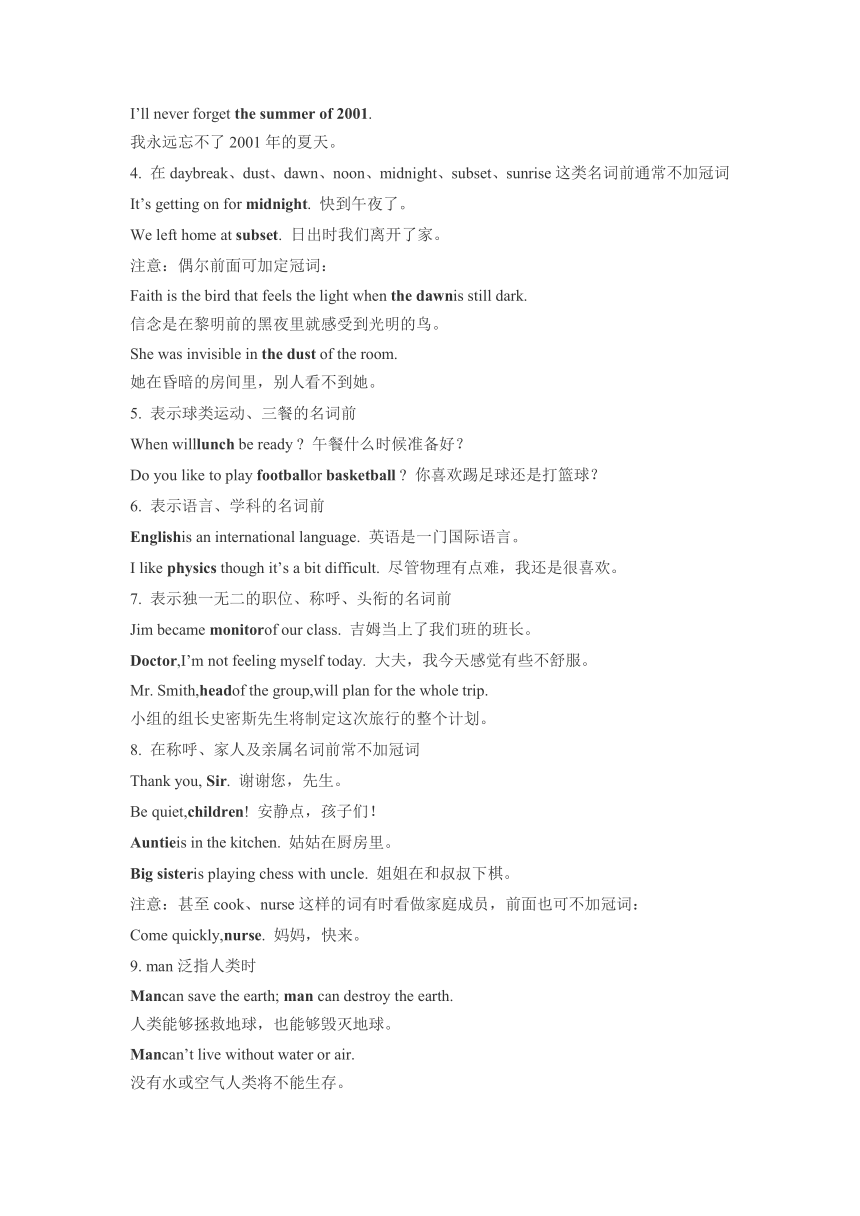零冠词(不用冠词)的使用场合总结2022年中考英语语法总复习(word版)
文档属性
| 名称 | 零冠词(不用冠词)的使用场合总结2022年中考英语语法总复习(word版) |  | |
| 格式 | doc | ||
| 文件大小 | 35.0KB | ||
| 资源类型 | 教案 | ||
| 版本资源 | 通用版 | ||
| 科目 | 英语 | ||
| 更新时间 | 2022-01-19 10:19:39 | ||
图片预览


文档简介
零冠词(不用冠词)的使用场合总结 2022年中考英语语法总复习
1. 表示独一无二的职位、头衔的名词作表语、同位语、补足语,其前不加冠词
He was elected mayorof the city. 他当选该市市长。
He is still headof the organization. 他仍然是这个组织的首脑。
He succeeded his father as president of the company. 他接替父亲担任公司董事长。
注意:在turn后的表语都不带冠词:
He has turnedbotanist. 他成了植物学家。
注意:在title和rank后,名词前也多不带冠词:
I prefer the title of reporter. 我更喜欢记者的头衔。
That officer holds the rank of captain. 那位军官的官阶为上尉。
2. 个体名词抽象化后,前面也不加冠词
The trees were all inflower. 树都开花了。
We invited him for dinner. 我们邀请他吃晚餐。
What time does church begin 什么时候开始做礼拜?
大量短语的名词前不加冠词:
From beginning to end 从头到尾
From head to foot 从头到脚
From day to day 日复一日
From time to time 不时地
Year after year 年复一年
In case of ... 在......的情况下
In place of 代替
Make fun of 拿......开玩笑
Make room for 给......腾地方
3. 表示季节、月份、日期的名词前一般不加冠词
October 1st is our national day. 十月一日是国庆节。
Friendship does not freeze in winter. 真正的友谊冬天也不会冻结。
We go to school from Mondayto Friday. 我们星期一到星期五上课。
注意:如果有限制性定语修饰,则应加定冠词:
Nanchang Uprising took place on the 1stof August 1927.
南昌起义是1927年8月1日爆发的。
I’ll never forget the summer of 2001.
我永远忘不了2001年的夏天。
4. 在daybreak、dust、dawn、noon、midnight、subset、sunrise这类名词前通常不加冠词
It’s getting on for midnight. 快到午夜了。
We left home at subset. 日出时我们离开了家。
注意:偶尔前面可加定冠词:
Faith is the bird that feels the light when the dawnis still dark.
信念是在黎明前的黑夜里就感受到光明的鸟。
She was invisible in the dust of the room.
她在昏暗的房间里,别人看不到她。
5. 表示球类运动、三餐的名词前
When willlunch be ready 午餐什么时候准备好?
Do you like to play footballor basketball 你喜欢踢足球还是打篮球?
6. 表示语言、学科的名词前
Englishis an international language. 英语是一门国际语言。
I like physics though it’s a bit difficult. 尽管物理有点难,我还是很喜欢。
7. 表示独一无二的职位、称呼、头衔的名词前
Jim became monitorof our class. 吉姆当上了我们班的班长。
Doctor,I’m not feeling myself today. 大夫,我今天感觉有些不舒服。
Mr. Smith,headof the group,will plan for the whole trip.
小组的组长史密斯先生将制定这次旅行的整个计划。
8. 在称呼、家人及亲属名词前常不加冠词
Thank you, Sir. 谢谢您,先生。
Be quiet,children! 安静点,孩子们!
Auntieis in the kitchen. 姑姑在厨房里。
Big sisteris playing chess with uncle. 姐姐在和叔叔下棋。
注意:甚至cook、nurse这样的词有时看做家庭成员,前面也可不加冠词:
Come quickly,nurse. 妈妈,快来。
9. man泛指人类时
Mancan save the earth; man can destroy the earth.
人类能够拯救地球,也能够毁灭地球。
Mancan’t live without water or air.
没有水或空气人类将不能生存。
10. 名词前有某些限定词时
英语名词前如果出现this、that、these、any等限定词,其前不能加冠词。
This is my address, let’s keep in touch.
这是我的地址,让我们保持联系吧。
Loneliness is all around me; I pass through this wallthat I’ve made.
寂寞环绕着我,我穿过这堵自己亲手制造的围墙。
用法比较:
I was ill last week.
我上周病了。(指这个星期以前的一个星期)
I have been ill for the last week.
我已经病了一个星期了。(指从过去某个时间一直延续到说话时的一周)
11. 名词在介词后表示抽象概念时
介词后表示抽象概念时为习惯用法。
He is still in hospital. 他仍在医院。
I don’t go to middle school,I’m at college. 我不是上中学,而是上大学。
Did you go there by trainor by bus 你是坐火车还是公共汽车去的?
12. 单数名词相对应使用时
介词或连词连接的两个相同、相对或者关系密切的单数名词常不用冠词。
Day by day 日复一日
Father and son 父子
Step by step 逐渐地
Little by little 渐渐地
Hand in hand 手拉手
Face to face 面对面地
Husband and wife 夫妇
Side by side 肩并肩地
Day and night 日日夜夜
Day after day 日复一日
All day and all night 整日整夜
Heart and soul 全心全意地
Shoulder to shoulder 肩并肩地
Arm in arm 胳膊挽着胳膊
From time to time 时不时地
Time and time again 反复地
13. 在一些并列名词前,常可不加冠词
He went heard over heelsinto the water. 他栽倒掉进水里。
I cannot make head or tailof your letter. 我看不懂你的信。
It has handed down from father to sonfor many generations.
这东西父传子已经传了很多代了。
注意:此外还有不少这类并列词组,如:
Back to back 背靠背地
Heart-to-heart 推心置腹的
1. 表示独一无二的职位、头衔的名词作表语、同位语、补足语,其前不加冠词
He was elected mayorof the city. 他当选该市市长。
He is still headof the organization. 他仍然是这个组织的首脑。
He succeeded his father as president of the company. 他接替父亲担任公司董事长。
注意:在turn后的表语都不带冠词:
He has turnedbotanist. 他成了植物学家。
注意:在title和rank后,名词前也多不带冠词:
I prefer the title of reporter. 我更喜欢记者的头衔。
That officer holds the rank of captain. 那位军官的官阶为上尉。
2. 个体名词抽象化后,前面也不加冠词
The trees were all inflower. 树都开花了。
We invited him for dinner. 我们邀请他吃晚餐。
What time does church begin 什么时候开始做礼拜?
大量短语的名词前不加冠词:
From beginning to end 从头到尾
From head to foot 从头到脚
From day to day 日复一日
From time to time 不时地
Year after year 年复一年
In case of ... 在......的情况下
In place of 代替
Make fun of 拿......开玩笑
Make room for 给......腾地方
3. 表示季节、月份、日期的名词前一般不加冠词
October 1st is our national day. 十月一日是国庆节。
Friendship does not freeze in winter. 真正的友谊冬天也不会冻结。
We go to school from Mondayto Friday. 我们星期一到星期五上课。
注意:如果有限制性定语修饰,则应加定冠词:
Nanchang Uprising took place on the 1stof August 1927.
南昌起义是1927年8月1日爆发的。
I’ll never forget the summer of 2001.
我永远忘不了2001年的夏天。
4. 在daybreak、dust、dawn、noon、midnight、subset、sunrise这类名词前通常不加冠词
It’s getting on for midnight. 快到午夜了。
We left home at subset. 日出时我们离开了家。
注意:偶尔前面可加定冠词:
Faith is the bird that feels the light when the dawnis still dark.
信念是在黎明前的黑夜里就感受到光明的鸟。
She was invisible in the dust of the room.
她在昏暗的房间里,别人看不到她。
5. 表示球类运动、三餐的名词前
When willlunch be ready 午餐什么时候准备好?
Do you like to play footballor basketball 你喜欢踢足球还是打篮球?
6. 表示语言、学科的名词前
Englishis an international language. 英语是一门国际语言。
I like physics though it’s a bit difficult. 尽管物理有点难,我还是很喜欢。
7. 表示独一无二的职位、称呼、头衔的名词前
Jim became monitorof our class. 吉姆当上了我们班的班长。
Doctor,I’m not feeling myself today. 大夫,我今天感觉有些不舒服。
Mr. Smith,headof the group,will plan for the whole trip.
小组的组长史密斯先生将制定这次旅行的整个计划。
8. 在称呼、家人及亲属名词前常不加冠词
Thank you, Sir. 谢谢您,先生。
Be quiet,children! 安静点,孩子们!
Auntieis in the kitchen. 姑姑在厨房里。
Big sisteris playing chess with uncle. 姐姐在和叔叔下棋。
注意:甚至cook、nurse这样的词有时看做家庭成员,前面也可不加冠词:
Come quickly,nurse. 妈妈,快来。
9. man泛指人类时
Mancan save the earth; man can destroy the earth.
人类能够拯救地球,也能够毁灭地球。
Mancan’t live without water or air.
没有水或空气人类将不能生存。
10. 名词前有某些限定词时
英语名词前如果出现this、that、these、any等限定词,其前不能加冠词。
This is my address, let’s keep in touch.
这是我的地址,让我们保持联系吧。
Loneliness is all around me; I pass through this wallthat I’ve made.
寂寞环绕着我,我穿过这堵自己亲手制造的围墙。
用法比较:
I was ill last week.
我上周病了。(指这个星期以前的一个星期)
I have been ill for the last week.
我已经病了一个星期了。(指从过去某个时间一直延续到说话时的一周)
11. 名词在介词后表示抽象概念时
介词后表示抽象概念时为习惯用法。
He is still in hospital. 他仍在医院。
I don’t go to middle school,I’m at college. 我不是上中学,而是上大学。
Did you go there by trainor by bus 你是坐火车还是公共汽车去的?
12. 单数名词相对应使用时
介词或连词连接的两个相同、相对或者关系密切的单数名词常不用冠词。
Day by day 日复一日
Father and son 父子
Step by step 逐渐地
Little by little 渐渐地
Hand in hand 手拉手
Face to face 面对面地
Husband and wife 夫妇
Side by side 肩并肩地
Day and night 日日夜夜
Day after day 日复一日
All day and all night 整日整夜
Heart and soul 全心全意地
Shoulder to shoulder 肩并肩地
Arm in arm 胳膊挽着胳膊
From time to time 时不时地
Time and time again 反复地
13. 在一些并列名词前,常可不加冠词
He went heard over heelsinto the water. 他栽倒掉进水里。
I cannot make head or tailof your letter. 我看不懂你的信。
It has handed down from father to sonfor many generations.
这东西父传子已经传了很多代了。
注意:此外还有不少这类并列词组,如:
Back to back 背靠背地
Heart-to-heart 推心置腹的
同课章节目录
- 词法
- 名词
- 动词和动词短语
- 动词语态
- 动词时态
- 助动词和情态动词
- 非谓语动词
- 冠词
- 代词
- 数词和量词
- 形容词副词及其比较等级
- 介词和介词短语
- 连词和感叹词
- 构词法
- 相似、相近词比较
- 句法
- 陈述句
- 一般疑问句和否定疑问句
- 特殊疑问句及选择疑问句
- 反意疑问句
- 存在句(There be句型)
- 宾语从句
- 定语从句
- 状语从句
- 主谓一致问题
- 简单句
- 并列句
- 复合句
- 主谓一致
- 主、表语从句
- 名词性从句
- 直接引语和间接引语
- 虚拟语气
- 感叹句
- 强调句
- 倒装句
- 祈使句
- 句子的成分
- 句子的分类
- 题型专区
- 单项选择部分
- 易错题
- 完形填空
- 阅读理解
- 词汇练习
- 听说训练
- 句型转换
- 补全对话
- 短文改错
- 翻译
- 书面表达
- 任务型阅读
- 语法填空
- 其他资料
